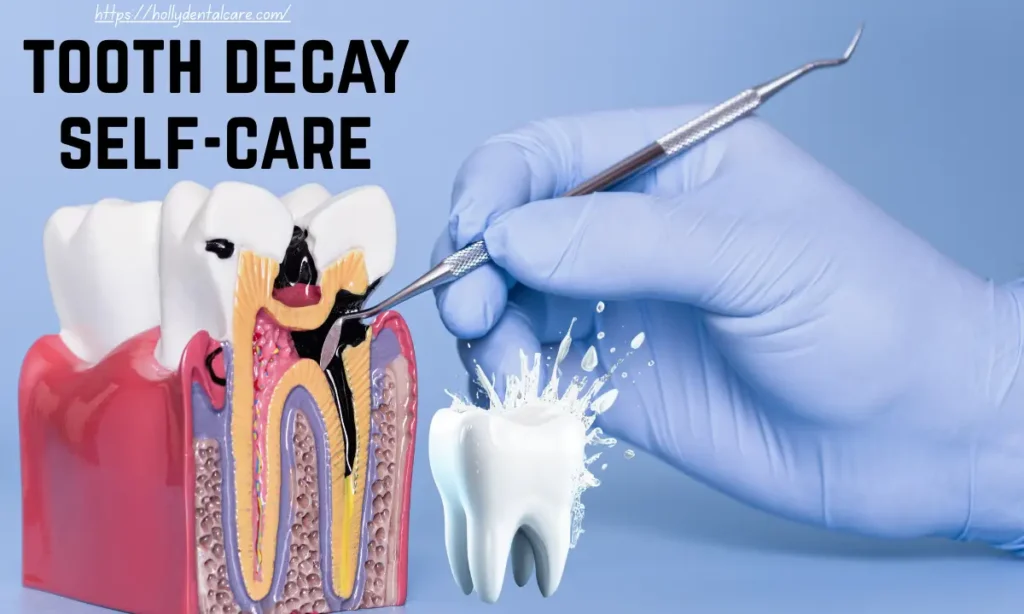Dental caries or cavities are tooth decay that have been reported as one of the most common chronic health problems globally. The condition is possible in children who are growing the first set of teeth and in old people who have gum recession and exposed roots, that is why it can affect the whole human age range.One of major issues that can be prevented to a large extent is tooth decay. One can keep the teeth strong and healthy and have a nice smile for the rest of their life just by learning the process of tooth decay and following simple but effective tooth decay self-care routines.
What Is Tooth Decay?
The disease typically moves on to several stages:
- First de-mineralization: The minerals are taken away from the enamel surface, and the damage at this stage is commonly reversible by the use of fluoride and remineralizing agents.
- Enamel destruction: The surface gets either rough or a tiny hole forms.
- Dentin participation: Bacteria penetrate deeper into the tooth and thus, the patient may experience sensitivity or discomfort.
- Pulp infection: In case decay gets to the tooth’s inner nerve tissue, it might cause unbearable pain or infection, hence, treatment like a root canal or, if the situation is severe, extraction will be needed.
How does a cavity develop?
- Firstly, caries are bacterial plaque that come mainly from bacteria such as Streptococcus mutans and Lactobacillus.
- After that, these bacteria are continuously fed by frequent snacking or sipping sweet drinks continually.
- Next, acid attacks that last 20-30 minutes after eating gradually weaken enamel.
- Furthermore, the reduced saliva flow limits acid neutralization and mineral repair.
Warning Signs
- White, brown, or black spots on teeth
- Sensitivity to cold, heat, or sweets
- Bitter breath or bad breath that persists
- Uneven tooth surfaces or holes which can be seen
- The pain of a tooth or a pulse of pain (most of the time in the later stages)
Foundations of Tooth Decay Self-Care
Daily oral hygiene
- First of all, daily oral care that should not be overlooked is the base which will protect us against cavities.
- Use a fluoride mouthrinse to help the enamel to be more resistant against cavities.
- Only after getting permission from your dental professional, use antibacterial rinses like chlorhexidine or cetylpyridinium when you are short of breath.
Diet and nutrition
- Foods and nutrition are the main factors in keeping teeth healthy.
- Reduce the intake of sugars that are found in candies, sodas, flavored milk, and sticky snacks by eating less in order to have less food for bacteria that cause decay.
- Do not snack all the time and have at least two to three hours in between eating so that saliva can neutralize acids.
- Water is what you need and the best is fluoridated tap water. Keep drinking it throughout the day.
- Cheese, yogurt, nuts, and crunchy fruits or vegetables are the most tooth-friendly foods that you can include in your diet to increase saliva flow and to provide calcium and phosphate.
Fluoride and other remineralizing agents
- Fluoride along with other remineralizing agents should be a must in the process of enamel repair and strengthening.
- Fluoride helps create fluorapatite which is resistant to acids and that makes the enamel more protective against decay.
- Moreover, it supports the re-deposition of minerals in the enamel that has been weakened and also diminishes the production of acid by bacteria.
- Some of the products from which we can derive fluoride are toothpaste, mouthrinses and fluoridated water.
- Dentists might use fluoride gels or varnish for the patients who are more prone to getting cavities.
- Moreover, some other substances like calcium phosphate, nano-hydroxyapatite, and xylitol gum can provide further support for the process of enamel repair and remineralization.
Monitoring Your Oral Health
Even if you take very good care of yourself every day, it is still necessary to do regular self-checks and have professional assessments. Every week, look at your teeth with a good light and search for the appearance of discoloration, rough areas, or new sensitivity. Record your brushing and flossing movements in a journal or use a mobile app in order to keep yourself accountable. Dental check-ups should be arranged every six to twelve months, or every three to four months if you are at a higher risk, so your dentist can find and treat problems early with which they do not become serious.
When to Seek Professional Help
Oral health is largely dependent on the role played by home care. However, it is not in a position to reverse the progression of the cavities. A visit to the dentist as soon as possible becomes imperative if you are suffering from a toothache that doesn’t go away and probably you will notice the cavities and the tooth may be dark, there may also be swelling of the gums, jaw, or face, and the sensitivity might stay after eating or drinking hot or cold items.
Conclusion
Bright white teeth are far from being just an attractive feature in your appearance—they are the basic requirements for proper chewing, speaking clearly, and building your overall confidence. Prevention through tooth decay will be easy if done correctly but it still necessitates a pledge from the individual: cleaning properly, eating smartly, using fluoride, and visiting your dentist regularly. You can keep your teeth healthy for many years if you keep up the good habits.
Also read:- www.healthsciencesforum.com: Health, Wellness & Care



